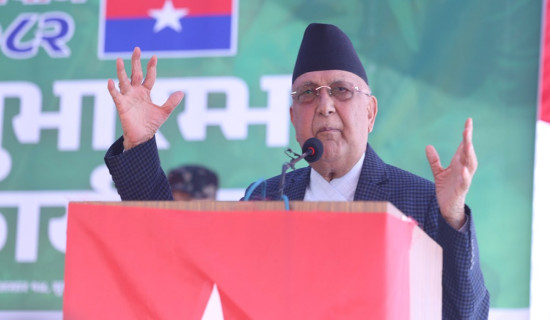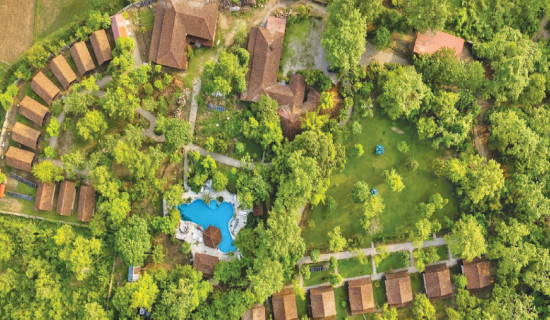- Saturday, 28 June 2025
Yuddha Prasad Mishra: Poet of nature and change
Poet Yuddha Prasad Mishra is one of the top Nepali poets. He is renowned for his naturalistic and transformative poetry. In the first stage of his poetic practice, he wrote some poems influenced by Hindu spiritual thought, but at this time, his poems revealed naturalistic idealism. Senior Nepali critics such as Hrishikesh Upadhyay, Taranath Sharma, Krishnachandra Singh Pradhan, Vasudev Tripathi, Ravilal Adhikari, and Mohanraj Sharma have praised poet Mishra's naturalistic and pure nature poetry. They believe that Mishra has created naturalistic romantic poetry of a level that can be placed in the ranks of the Mahakavi Lakshmi Prasad Devkota and Yugkavi Siddhicharan Shrestha.
Imagination, love of nature, sovereignty in nature, humanisation of nature, feeling of pain and suffering in nature, presentation of peace, liberation and love in nature, national spirit, rebellious voice, and such are few of the qualities of naturalistic romantic poetry expressed in Mishra's poetry. The use of lyricism in poetry is the best feature of Mishra.
Discussing the lyrical style of writing in Nepali Romantic poetry, Taranath Sharma states that this poetic style has danced with Yuddha Prasad and played swing with Lakshmi Prasad Devkota. Similarly, Mohanraj Sharma thinks that Mishra has a unique ability to express nature in a pictorial style.
Poet Mishra wrote Charkhandiko khoch, Jabiko chara, Charako bol, Suryaghat, Vyadhgan-1; 2, Hridayapanchhi, Dhobiniko sangit, Simbakkullo, Chariko chchch, Kokil gaan, Pagal-1; 2, Jalan -1; 2; 3; 4, Kavi -1; 2, Sundar kanthi charo and such naturalistic poems. Poet Mishra, who started writing from Hindu spiritual thought, became an excellent poet when he came to create naturalistic poetry.
Mishra saw and experienced the repressive regime of the monarchy, social superstitions, poverty and class discrimination, the underdeveloped state of the country, the miserable life of the people on one side and the beautiful nature, friendly people and a beloved country on the other. Love of nation and people, wonderful desire for freedom and liberation, ardent interest to achieve democracy and republic encouraged him to write poems. As a result, he became a naturalist in poetry writing and gradually became a social realist and moved towards a critical realist stream.
Especially after participating in the anti-Rana movement of B.S. 2004, the door of rebel and social realist poetry seems to have opened. In fact, in 1986 B.S., the short poem 'Ahimsa Prarthana' written by him was burnt by Rana Prime Minister Bhim Shamsher because of anti-Rana sentiments. What this shows is that things like rebellion, irony and humanity were awakened in Mishra's poetic consciousness at an early stage.
The anti-Rana movement and the unsatisfactory situation for the poet after the attainment of democracy seem to have developed a progressive approach in him. While this feeling of his is taking a poetic form, the change of 2017 becomes an important event. After the Panchayat system was implemented, the feeling of anti-Panchayat system becomes stronger in Mishra due to the suffering and hardships in the working life. Not only that, he comes to a conclusion that he cannot live in the country and goes to Banaras, India to spend days of self-exile.
His creative work, which lost momentum for some time, becomes active again due to his contact with the political parties and his closeness with various literary and cultural organizations and persons during his life in self-exile. He continues to create patriotic, awakening, transformative and revolutionary poetry against the autocratic regime in the country.
This time lasted from 2018 to 2040 B.S. Poet Mishra returns home in 2040 from India. After returning home, he gets high esteem as a revolutionary progressive poet. It seems that he is the leader of writers and artists who want to achieve democracy and anticipate a republic system in the country. His poetry became a source of energy for the movement as it was passionate, rebellious and visionary. His poems became the light of the call to establish a new beneficial governance system for the country and the people by demolishing orthodox traditions, superstitions, feudal oppression, tyranny, and misuse of the state power.
Mishra's presence became energetic in the programmes of anti-authoritarian revolutionary writers, poets, and artists organized, especially in Kathmandu and surrounding areas. Equipped with a transformative approach to make people aware from children to the elderly, his poems became songs and started playing as a sharp weapon of the anti-authoritarian movement. Whether it was a programme organized inside a room or in a meeting hall, whether it was an open stage programme, songs like Mishra's volcanoes ignited the flame of passion, vigour, determination and rebellion in the mind of the agitators and changemakers.
Poet Mishra stood at the forefront of the anti-authoritarian movement and led the movement of Nepali poets, writers, and artists. On Chaitra 3, 2046, he came to a programme organized by the revolutionary writers and artists with a black band around his mouth to provide leadership. Mishra was 83 years old at that time. Although his body was old, he had no less passion, no less determination, no less enthusiasm than any youth.
When the police arrested Mishra from the programme, he was saying, "The movement will continue, now change is ahead of us." When the old Mishra, who was carrying a stick with one hand, raised another hand and greeted the poets, writers, and the people present, they showed respect to him with thunderous applause.
Poet Yuddha Prasad Mishra, who created poems that had expectations of Nepali soil, nature, Nepali nation, Nepali people and changes according to time throughout his life, was born on Saturday 27th Paush 1964 B.S. at Somlingtar in Sirutar, Bhaktapur. The natural environment of his village, family situation, friends, social customs, the state of the country, the character of the ruler, etc. were the sources of inspiration for Mishra to practice poetry.
Poet Mishra also wrote some stories during his lifetime. A collection of stories called 'Amar Katha' has been published. In the later part of his life, he also wrote some poems for children. His literary works are 'Ahimsa Prathana' (unpublished) poem: 1986), 'Chara' (Anthology of poetry: 1994), Amar Katha (anthology of short stories: 2015), Muktiramayan (Khandakavya: 2027), Muktasudama (Khandakavya: 2029), Bhadi (Anthology of poetry: 2029), Yuddha Prasad Mishraka Kavitaharu (Anthology of poetry: 2049), School jaau (Child poem: 2057), School janchhu tam tam tam (Child poem: 2063), Vidhyrthi biralo (Child poem: 2063), Hamro bhainsi bubu dinchha (Child poem: 2063), Manamanai ka kha bhanchhu (Child poem: 2064), Aankhai matra tarchhan (Child poem: 2064), Yuddha Prasad Mishraka Kavya Rachanaharu (Anthology of poetry: 2064), Yuddha Prasad Mishraka Pratinidhi Kabitaharu (Anthology of poetry: 2079).
Poet Yuddha Prasad Mishra, who took a lifelong literary lead to prepare the background for political change in Nepal, died on Falgun 6, 2047. No matter how much he contributed to change from his place, the government that took over the country after each change could not remember Mishra's contribution. It is the same situation until today.
Hopefully, this will not happen in the future. The guiding elders will be remembered, and they will be respected. On the occasion of the 117th birth anniversary of Kavi Yuddha Prasad Mishra, we remember and respect him.
(Nandu Uprety is general secretary, Yuddha Prasad Mishra Memorial Foundation.)
















